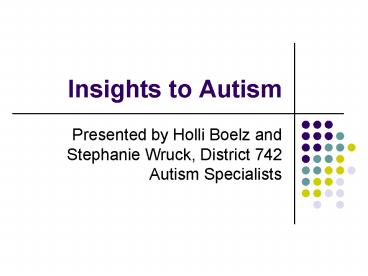Insights to Autism - PowerPoint PPT Presentation
1 / 30
Title:
Insights to Autism
Description:
Autism is a brain disorder that typically affects a person's ability to ... a combination of functional speech, jargon, and immediate/delayed echolalia ... – PowerPoint PPT presentation
Number of Views:49
Avg rating:3.0/5.0
Title: Insights to Autism
1
Insights to Autism
- Presented by Holli Boelz and Stephanie Wruck,
District 742 Autism Specialists
2
What is Autism?
- Autism is a brain disorder that typically
affects a persons ability to communicate, form
relationships with others, and respond
appropriately to the environment
3
Autism Spectrum Disorders
Pervasive Developmental Disorder Not Otherwise
Specified (PDD-NOS)
Autism
Aspergers Syndrome
Rett Syndrome
Disintegrative Disorder
DSM IV
4
What Causes Autism?
- Researchers have not found a specific cause
- Evidence indicates there are genetic factors
involved and that there are biological and/or
neurological differences in the brains of
children with Autism
5
- Some people with autism are relatively high
functioning with speech and intelligence intact - Some people are developmentally delayed,
non-verbal, or have serious language delays - Some people seem closed off and shut down, while
others seem locked into repetitive behaviors and
rigid patterns of thinking
6
- Although people with autism do not have exactly
the same symptoms and deficits, they tend to
share certain social, communication, motor, and
sensory problems that affect their behavior in
predictable ways. - Regions 5 7, 00
7
Mildly Impaired Social Behavior
- Socially interested but limited social exchange
- Seeks social interactions
- Relationships hampered by limited understanding
of perspectives and feelings of others
8
Moderately Impaired Social Behavior
- Shows enjoyment in a limited number of social
routines. - Shows little interest in interacting with peers
- May engage in parallel play or chasing games
9
Severely Impaired Social Behavior
- Shows limited social awareness and interest
- Social interactions may be limited to simple
routines with familiar adults - Shows little social initiation and can be
inconsistent in responsiveness to others
10
Mildly Impaired Language and Communication Skills
- Speaks in complete sentences
- Language may be rigid or inflexible
- Conversational skills may be limited by the
strong interest in particular topic - Poor understanding of non-verbal cues
- May have comprehension problems and difficulty
with abstract concepts
11
Moderately Impaired Language and Communication
Skills
- Verbalizations may contain a combination of
functional speech, jargon, and immediate/delayed
echolalia - Initiation of communication is for the purpose of
meeting needs rather than social interactions
12
Severely Impaired Language and Communication
Skills
- Does not use functional speech
- Non-verbal communication is limited and may
include using others hands as tools
13
Mildly Impaired Restrictive Range of Interests
- Shows some behavioral rigidity and inflexibility
- May have a few specific routines or rituals that
minimally interfere with daily activities
14
Moderately Impaired Restrictive Range of
Interests
- Resists changes in routines or interruption of
activities - Shows repetitive play with toys and may have
motor stereo-types such as rocking or spinning
15
Severely Impaired Restricted Range of Interests
- Shows extreme resistance to changes in activities
and routines - Stereotyped motor behaviors are difficult to
redirect - May focus on sensory aspects of toys or other
objects
16
Mildly Impaired Reaction to Sensory Stimulation
- Minimal reaction to lights, sounds, touch, or
movement
17
Moderately Impaired Reaction to Sensory
Stimulation
- Unusual or inconsistent responses to sensory
input such as lights, sounds, touch, or movement.
18
Severely Impaired Reaction to Sensory Stimulation
- Unpredictable responses to sensory input
- Over-reacts or under-reacts to pain
19
What do you need to know when you encounter a
child with ASD?
- Here are 10 things every child with ASD wishes
you knew! - Adapted from the book by Ellen Notbohm
20
I am first and foremost a child
- Use person first language
- Dont define by one characteristic
21
My sensory perceptions may be disordered
- Be open to making accomodations
22
Please remember to distinguish between wont (I
choose not to) and cant (I am not able to)
- Come speak directly to me in plain words
23
I may be a concrete thinker
- May interpret language very literally
- Limit your use of sarcasm and figurative language
24
Please be patient with my vocabulary
- I may have a limited vocabulary
- I may sound like a little professor, but it may
not reflect what I am understanding
25
Because language may be difficult for me, I might
be more visually orientated
- Please show me how to do something rather than
just telling me, and please be prepared to show
me many times
26
Please focus and build on what I can do rather
than what I cant do
- There is more than one right way to do most
things! - Realize that I have strengths
27
Please help me with social interactions
- It may look like I dont want to interact with
other kids, but sometimes its just that I simply
dont know how to start a conversation or join an
activity
28
Understand that all behavior is a form of
communication
- If you can figure out why my meltdowns occur,
they can be prevented - Behavior tells you, when my words cannot, how I
perceive something that is happening in my
environment
29
Appreciate me for who I am
- I did not choose to have ASD. But remember that
it is happening to me, not you. With your
support and guidance, the possibilities of a
successful future are broader than you might
think. I promise you I am worth it.
30
If youd like to contact us
- Holli Boelz
- Apollo High School
- Ext. 2590
- Stephanie Wruck
- Apollo High School
- Ext. 2589






























![[PDF] Ido in Autismland: Climbing Out of Autism’s Silent Prison Full PowerPoint PPT Presentation](https://s3.amazonaws.com/images.powershow.com/10078362.th0.jpg?_=20240713077)
